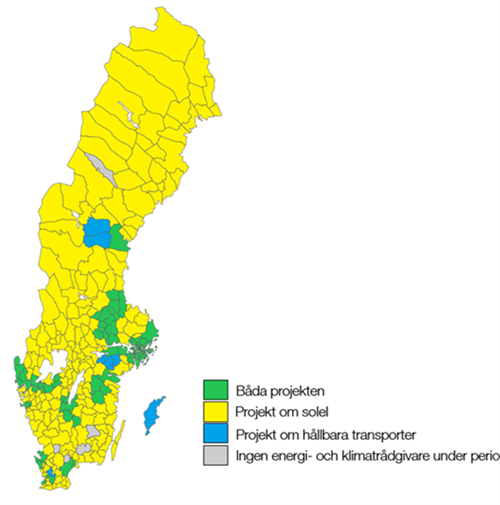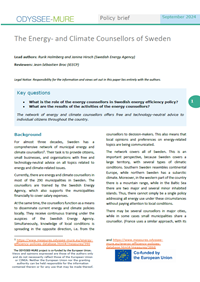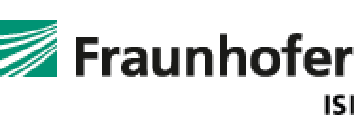Summary
Key questions
- What is the role of the energy counsellors in Swedish energy efficiency policy?
- What are the results of the activities of the energy counsellors?
The network of energy and climate counsellors offers free and technology-neutral advice to individual citizens throughout the country.
Lead authors: Rurik Holmberg and Janina Hirsch (Swedish Energy Agency)
Reviewers: Jean-Sébastien Broc (IEECP)
Background
For almost three decades, Sweden has a comprehensive network of municipal energy and climate counsellors1. Their task is to provide citizens, small businesses, and organisations with free and technology-neutral advice on all topics related to energy and climate-related issues.
Currently, there are energy and climate counsellors in most of the 290 municipalities in Sweden. The counsellors are trained by the Swedish Energy Agency, which also supports the municipalities financially to cover salary expenses.
At the same time, the counsellors function as a means to disseminate current energy and climate policies locally. They receive continuous training under the auspices of the Swedish Energy Agency. Simultaneously, knowledge of local conditions is spreading in the opposite direction, i.e. from the counsellors to decision-makers. This also means that local opinions and preferences on energy-related topics are being communicated.
The network covers all of Sweden. This is an important perspective, because Sweden covers a large territory, with several types of climatic conditions. Southern Sweden resembles continental Europe, while northern Sweden has a subarctic climate. Moreover, in the western part of the country there is a mountain range, while in the Baltic Sea there are two major and several minor inhabited islands. Thus, there cannot simply be a single policy addressing all energy use under these circumstances without paying attention to local conditions.
There may be several counsellors in major cities, while in some cases small municipalities share a counsellor. (France uses a similar approach, with its shared energy advisors for local authorities2). In the more densely populated regions, there are regional energy offices for the coordination of energy-related activities. In major cities, people can easily get information about energy solutions from commercial actors, but such information is always biased, at least to some extent. Therefore, it has been considered important to also maintain the presence of municipal energy counsellors in major cities. There are similar private initiatives in this field, but they tend to be either part of customer relations or advertising by a company, i.e. with the purpose of attracting new customers or to promote customer loyalty. These companies, however, mostly recommend the solutions they are offering.
Figure 1: Projects by energy advisors by municipality

Source: Swedish Energy Agency. Yellow: installation of solar cells. Blue: sustainable transport. Green: both. The grey areas are currently lacking energy advisors.
Changing tasks
When the system of energy counsellors was introduced in 1997, the primary task of the counsellors was to provide individuals with advice on how to improve their energy standards when constructing or retrofitting their homes. Over time, however, the tasks have expanded to include advice to housing associations, all types of organisations, and small businesses. The counsellors are also supposed to carry out some outreach activities, such as visiting schools and other institutions.
It is generally assumed that the counsellors played a significant role in the rollout of heat pumps in 2000-2010, whereby Sweden became one of the countries with the highest penetration rate of heat pumps in individual homes.
It should be pointed out that energy efficiency is only a part of the counsellors’ portfolio, which also includes other energy use (e.g. renewables) and issues related to climate change.
However, the main task of the counsellors is still to provide neutral information on energy-related issues, which commercial providers of energy solutions naturally cannot be expected to do. It has been reported by the counsellors that the general public often asks for more specific information. This is a tricky situation for the individual counsellors, who are not supposed to tell if one technology is to be preferred over another.
Challenges
When the system of energy counsellors was established, it could not be foreseen that in the future there would be demand for measurable actions for energy efficiency. Therefore, there was no built-in mechanism for measuring how many kWh saved could be attributed to the counsellors. As a result, it can only be said that the contribution of the counsellors has been significant, but this statement contains no quantitative assessment.
During the energy price crisis, the demand for services from the energy counsellors rose sharply, from 15,800 requested appointments in the entire year 2021 to more than 25,500 between January and October 2022. This indicates that they continue to play an important role in the eyes of the general public. It is worth noticing that more than half of the appointments are made over the telephone. This can be assumed to be the case because the telephone allows for more detailed conversation than the internet. The number of physical meetings actually increased in 2022 despite COVID, because the restrictions in Sweden were relatively lenient. Most of this increase took place thanks to physical meetings with companies and organisations. The total share of all physical meetings was 19%.
The counsellors naturally keep track of their activities and, as mentioned previously, the counsellors played an important role when the heat pumps became the first choice of Swedish house-owners.
The system of energy counsellors has been evaluated several times. The evaluations conclude that the counsellors contribute to concrete energy efficiency measures, but exactly to what extent is unknown. The evaluations also conclude that the counsellors have played a major role in increasing knowledge and competence among the population. They have also enabled consumers of energy efficiency solutions to make more informed choices. The vast majority (more than 90%) of those who turned to the counsellors in 2022 (both individuals, companies, and organisations) considered that they got an answer to their questions. An almost similar share said they received important information for their decision-making. More than 60% of the respondents said the advice led to actual measures on their part. The most common topic in 2022 was the installation of photovoltaic cells followed by heat pumps.
Summary and future perspectives
At present, it seems obvious that the system of energy and climate counsellors will remain in place. The long-term importance of their activity was questioned a decade ago, but by broadening their field of activity and introducing better follow-up, criticism has all but disappeared. However, unless new important fields of activity emerge, the energy counsellor system will likely be questioned again.
There have been calls for the energy counsellors’ reporting to be better aligned with the Energy Efficiency Directive, i.e. quantifying the results of their activity. So far, this has not been seen as an appropriate step, especially because it is impossible to say whether a measure carried out in a place of residence or activity stems directly from the counsellors’ contributions or if the underlying reasons are more complex. It could also be argued that several new requirements in the revised Energy Efficiency Directive, as well as in the revised Energy Performance of Buildings Directive, could be fulfilled through the energy and climate counsellor system.
However, energy counsellors can be said to have played a crucial role in the rollout of heat pumps in individual homes, thus giving Sweden a head start internationally. They also play a significant role in other energy and climate related areas, such as the installation of solar cells.
Furthermore, their role as a counterweight to commercial interests should not be underestimated. Both play their part, but in remote municipalities it’s not self-evident that commercial actors are present.
Notes
- 1: https://www.measures.odyssee-mure.eu/energy-efficiency-policies-database.html#/measures/390 and https://www.measures.odyssee-mure.eu/energy-efficiency-policies-database.html#/measures/3868
- 2: https://www.measures.odyssee-mure.eu/energy-efficiency-policies-database.html#/measures/1543
References
- Mignon, I., & Winberg, L. (2023). The role of public energy advising in sustainability transitions–empirical evidence from Sweden. Energy Policy, 177, 113525. https://doi.org/10.1016/j.enpol.2023.113525
- Regulation (2016:385) on grants for municipal energy and climate counselling (in Swedish). https://www.riksdagen.se/sv/dokument-lagar/dokument/svensk-forfattningssamling/forordning-2016385-om-bidrag-till-kommunal_sfs-2016-385
- Eriksson, L., & Kjeang, A. (2021). Local organization for promoting energy efficiency—reform of local energy advice service in Sweden. Energy Efficiency, 14(1), 12. https://link.springer.com/article/10.1007/s12053-020-09923-y
- Kjeang, A. E., Palm, J., & Venkatesh, G. (2017). Local energy advising in Sweden: Historical development and lessons for future policymaking. Sustainability, 9(12), 2275. https://doi.org/10.3390/su9122275
- Khan, J. (2006). Evaluation of the local energy advice programme in Sweden. https://lucris.lub.lu.se/ws/portalfiles/portal/5716981/3972506.pdf
- Fördjupad uppföljning energi- och klimatrådgivning (EKR) år 2022, (“In-depth follow-up energy- and climate counsellors in 2022”, with summary in English), Technopolis Group 2022.






